Here’s what’s funny, I didn’t really like this show at first. I first heard of it ’cause Lea Michele was my then-best-friend’s best friend once upon a time, and then I heard that it involved singing and dancing and Jane Lynch and well, that sounded pretty cool. Glee premiered in 2009, the year Autostraddle launched, and we prepared aggressively for the show’s debut, certain our five readers were as jazzed for a musical teevee show set in a midwestern high school as we were. We did a liveblog / drinking game for its September 9th premiere, and for about half of Season One, Carly provided you with episode mini-caps. We got up to Episode 112, at which point Carly had to stop writing for us because of her job and nobody else was still watching faithfully enough to recap the season’s back end. We let the show go, then, like we did with so many things during that hectic, cash-strapped time.
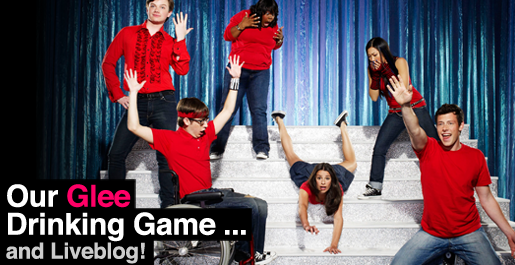
I liked the show, sure, but I didn’t love it. (I definitely didn’t expect, five years later, to be the one of the only people in my group of friends who still watch it.) I loathed the fake pregnancy plot, and each episode arc seemed remarkably identical to the last one. I loved the music, though: April and Rachel’s “Maybe This Time,” Kurt and Rachel’s “Defying Gravity,” Mercedes’ “And I Am Telling You I’m Not Going,” Mercedes’ “Beautiful,” Rachel and Shelby’s “I Dreamed a Dream” — I spent a lot on iTunes singles that year.
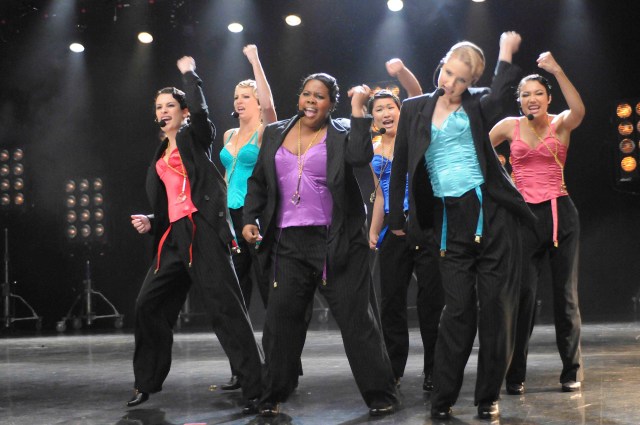
But something else happened that year: Mid-Season-One, Brittany had said that sex wasn’t dating because if sex were dating, then Santana and her would be dating. “I hope they follow up on this budding fuckbuddy situation with Santana and Brittany,” I wrote,”’cause that’s how these lesbian things often truly start, ladies. ” Shortly thereafter, Heather Morris told The Advocate that that little aside was all we’d ever get of Brittana. But we’d never expected a queer female character on the show, anyhow. We’d come for the singing and dancing. Glee was relevant to our interests insofar as we liked musical theater a lot and also Britney Spears, Madonna and Lady Gaga; female artists who each got or were gonna get their own episodes. We did an open thread for the season one finale and then the show went gently into the good night.
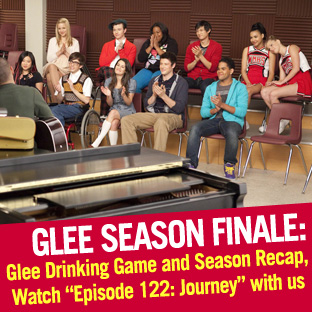
“Look, I didn’t know I was going to have to write something about Glee tonight,” said Alex in her recap for episode 201, noting that the only reason she was attempting at all was ’cause “we didn’t post anything today and Riese was freaking out about it!” This feels accurate. See, back then there wasn’t always a lot of stuff to write about. It’s wild to consider now — there are so many queer female teevee characters these days that I can’t fathom devoting such energy to a lady-gay-less program — but we often wrote about Glee because, indeed, something needed to go up. Something, anything. Rather than attempt a full recap, however, Alex made this diagram of how her brain reacts to watching Glee:
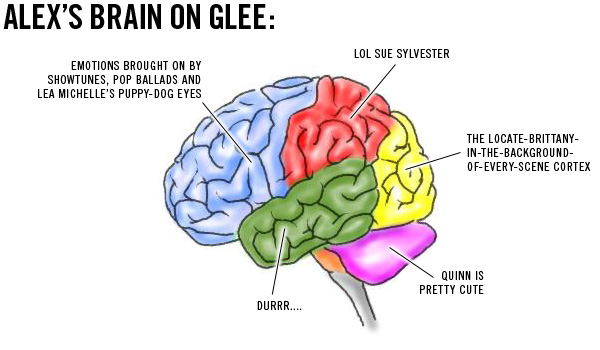
I’m not sure how we found Ashleigh, our next Glee recapper. She was an excellent writer but didn’t like our editing process and quit after two episodes: Britney/Brittany and Grilled Cheesus. “I do not love and adore this show like others do,” she told Laneia. “I only enjoy it on a basic level, and probably don’t have the strength left inside to find that tiny needle in the haystack of shit that we have so discussed earlier.” This was the fall of 2010, I’d just moved to California but didn’t have an apartment yet, so I slept on Taylor & Kip’s couch and watched television with my future girlfriend at the apartment she shared with her then-girlfriend, which’s where I was when we turned on the television to find Santana on top of Brittany, giving her sweet lady kisses. I screamed.
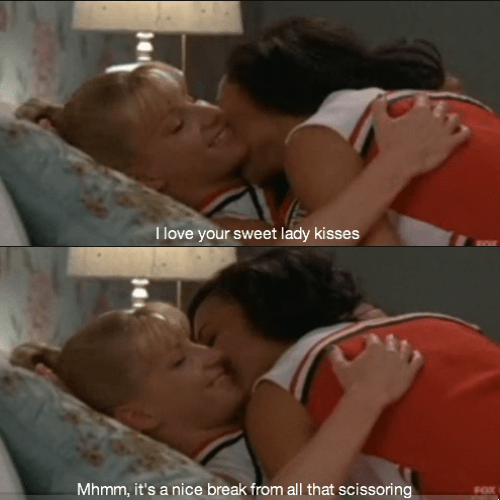
The post wrote itself, really, and did so briefly. Still, I expected absolutely nothing to come of it (as did Heather, we have recently learned), but it felt worth mentioning. This was the fall of It Gets Better, when all these young gay people were dying, when I somberly assigned myself the “suicide beat” and recounted death after death after death. Everybody was talking about bullying. We’d heard Glee planned to address it and therefore we really needed to get our shit together about this show. Palmer, our then-Managing-Editor who’d just started law school and usually wrote about politics, would sketch a basic recap and then I’d plow in and beef it up and thrust it out into the world. So we did that for two episodes, Rocky Horror and Never Been Kissed. But it was too much work on top of law school. And then.
riese: we didn’t get anyone to watch glee this week i just realized
i think it was on tonight
laneia: hi hello I am putting away brownies and going to bed. I wish I felt tired. Tireder.
more tired
A million people watched that fucking show. Surely to god one of them can write abt it for us.
Right?
riese: well
you know how people are
i found it on letmewatchthis
i can watch it
laneia: Sigh
riese: ew someone is barfing
on glee
And thus my Glee recapping career began. I didn’t even have Intern Grace yet, I just grabbed images from fan tumblrs — but before I could once again ask if any of our six unpaid writers were interested in taking over, something amazing happened: Furt.

It was our very first Very Special Episode, in which all expectations were met and exceeded, and we saw straight guys standing up for their gay buddies in a manner previously unseen on the television. This was big. Yeah, it was about boys, but it was a big fucking deal, and Glee was telling this story at the height of its popularity — when everybody was talking about the movie, the tour, dominating the iTunes charts, all that. Maybe because we were dying, Focus on the Family restrained itself from ruining our moment. I’ll talk more about this in our Things Glee Did Right post this week, but Furt is when I signed on, when I wanted to be the one to write about whatever gay shit this show was up to. Because this show has been nothing if not fearless, even when recklessly, outrageously so.
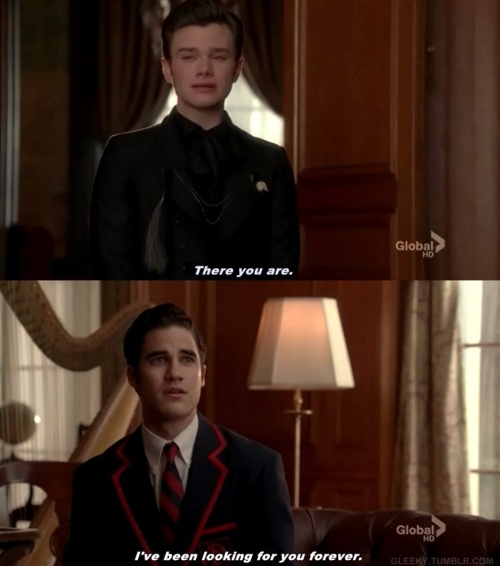
So I did — I didn’t write about the straight parts or the adult parts, just the gay parts and the music and the parts I liked. One week nothing gay happened so I didn’t recap and I was surprised when people asked me where my recap was. People really cared about my recap? Really? So, gradually, I committed. See, Season Two was undoubtedly its best, although Season Three had its moments. Season Two is when I blamed my “Blame it on the Alcohol” recap on the alcohol and they accidentally created a lesbian episode without any lesbians in it. Season Two is when “Trouty Mouth” happened. When this adorableness happened:
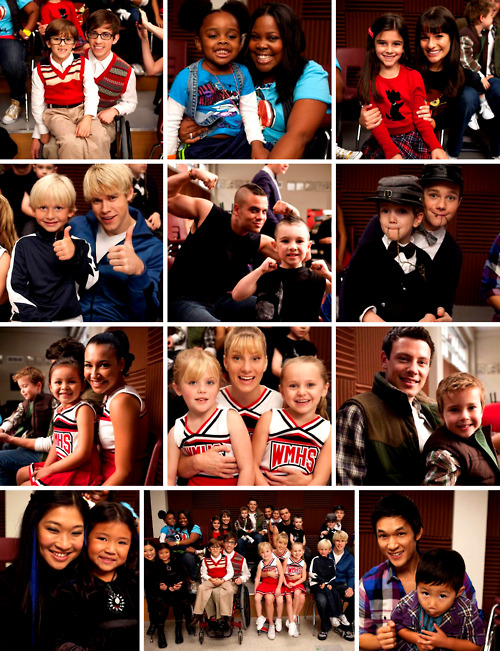
More importantly, Season Two is when I pulled up my formspring one cool May evening to find SANTANA IS A LESBIAN!!! in my inbox (I didn’t have a teevee at the time, so I had to wait for it to go up online) — LADIES I was SURPRISED. I did not see this coming and I was fucking PUMPED. Santana’s story was like mine in a way no other queer female character’s had been — and I talked about it then, and will talk more about it this week in that post I mentioned before.
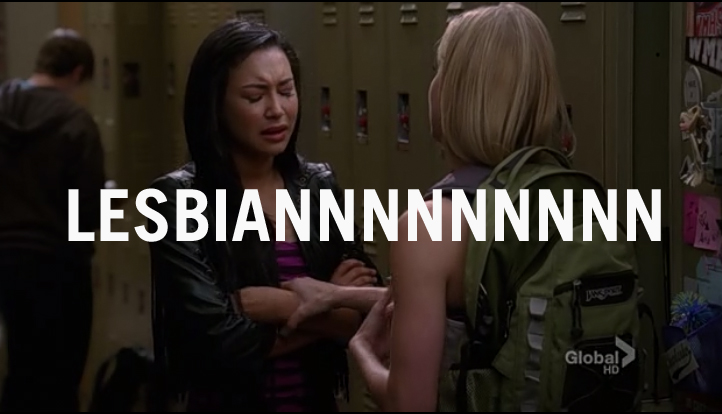
We were all in, now, and I had Intern Grace on board for all things screencap and graphic-related. Everything changed, then: now that Santana had come out as a lesbian and Brittany had confirmed her bisexuality, we had a stake in things, and feelings about how their characters were being handled. Blaine and Kurt’s subversive teenage romance shifted from being a universally celebrated thing to a thing many Brittana fans disdained for its blatant prioritization over the show’s lesbian relationship.
But it wasn’t just rivalries or increased expectations that sunk the show. It got messy. They fucked up a lot in really major ways. Finn outed Santana and basically got a medal for it, Glee clumsily handled Issue Episodes including but not limited to teen suicide, intimate partner violence, texting and driving, eating disorders, transgender bathroom bills and catfishing. Any semblance of consistency was thrown out the window, which made it hard to care about the events of any given episode when you knew those events could vanish from collective memory within a week. The show took a huge hit when Cory died, too. I can’t imagine anything was the same for the cast after that.
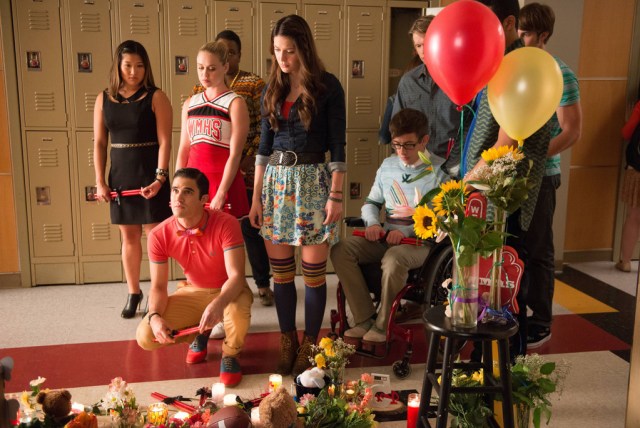
The Glee Project was failing as its own show and Glee‘s obligation to onboard its winners wasn’t doing them any favors. Unique had potential to be a revolutionary character but turned out to be the Idea of Tolerance wrapped in last year’s paper. Glee started suffering for cast sprawl just like The L Word — another six-season show that started out brilliant, fumbled a lot, had a brief comeback, binged on guest stars and wrapped everything up in a clumsy abbreviated last season that was half fanservice and half the opposite of fanservice — they kept adding and subtracting characters dodgeball-style, waiting to see what stuck and then rearranging the damaged bits next week. People stopped watching. You stopped watching! I missed you, my dearhearts, but have clung ever-tightly to those of you who remain here, still talking to me about this weird show.
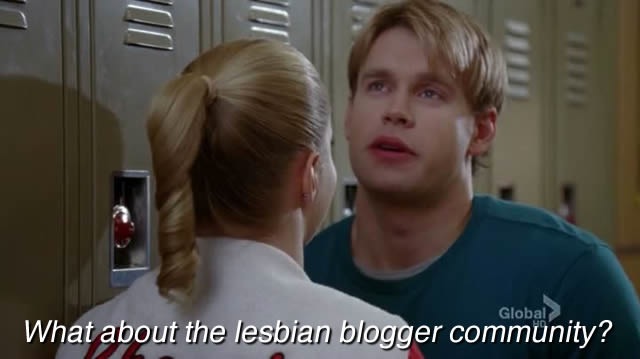
Ratings for Glee episodes plummeted as did ratings for people reading Glee recaps. Sometimes an episode would be so awful I could barely believe it had made it onto television. Sometimes an episode would be so brilliant that I could barely believe it happened the week after such an awful episode. But Glee was never smooth, exactly. The degree to which many romanticize its former glory is ridiculous. Every episode was about the same thing for many years: somebody tries to sabotage Glee Club, Glee Club finds a way to make it despite it all. Shit got recycled: We need to teach these guys to dance! Glee Club needs to raise money! Let’s get [person] to join Glee Club! [Person] is quitting the Glee Club! [Competition] is right around the corner and we’re not ready!
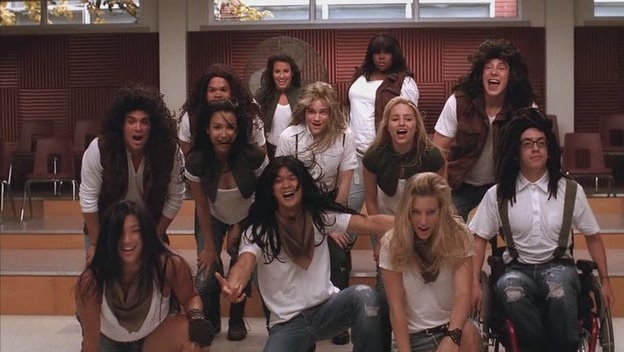
“There’s a common belief that Glee eventually flew off the rails,” wrote Emily Nussbaum in The New Yorker, “but really it just became a roller coaster, even within episodes.” Maybe we also didn’t mind the bumpiness so much in the beginning. When you’re first meeting a show, you’re a listener and the writers are explaining The World Of The Show to you, and you’re deciding whether or not you like it and want to move in. Then you move in, and everything changes, because even though the landlord’s in charge, you do, after all, live here. You are paying rent. And you hate those drapes and are confident that your sofa looked better before Rory, Joe, Ryder, Jake and Marley sat on it. You were kinda bummed about the rules about pets and then they changed the rules about pets — something you’d never anticipated happening! — but it was just a rule changed in writing, you still couldn’t get approval from anybody to actually get a pet. So you kept walking by the pet store, looking at a puppy named “lesbian action” and crying softly to yourself. You never would’ve renewed your lease if they hadn’t changed those rules, after all. Had you been tricked? Why was the landlord devoting all his attention to his new building instead of the one you still lived in? You have a lot of questions and you file a lot of complaints.
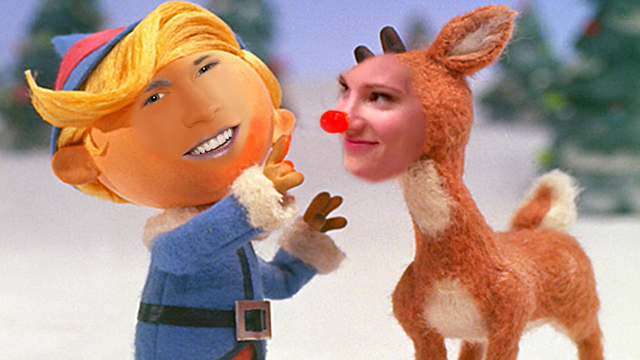
But through it all, Glee was rarely boring. It took risks, and fell flat on its face more and more as time went on, but it never stopped trying. Even when the show sucked, the music was still fun, and I stayed for the music. I tried to remember that this crew spent so much time every week practicing and recording and performing the episode’s songs that to them, the dialogue that happened in between each number probably felt pretty inconsequential. The choreography was so cheeky and campy and there was a little bit of everything I liked: Broadway, forgettable pop hits, classic rock. I always liked those big ending numbers, too! Everybody wore such colors. It was like a circus but also a high school but also a soap opera but also a rich gay man playing with puppets and a generous budget.
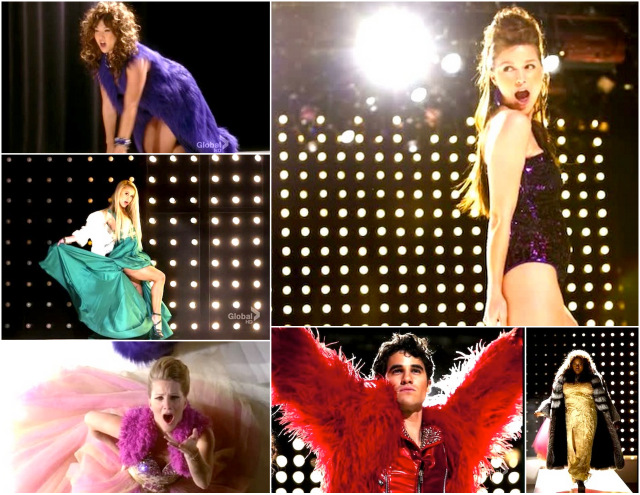
In Queer Eyes, Full Hearts, Emily Nussbaum argues that Ryan Murphy is a pioneer and a radical “worthy of our respect if not precisely our trust: he pushes the limits of television in ways as exciting as anyone up on that Mt. Rushmore of TV. His shows—which by now form a distinct portfolio—need to be considered in their logical framework. That context is not Shakespeare, or Dickens, or even Scorsese, but camp. Realism means little to Murphy; authenticity, less; subtlety, almost nothing.” Indeed.
In this last season, we finally got a lot of what we asked for, including a Brittany and Santana marriage. This season has focused entirely on the gay couples rather than the straight ones. I feel grateful for that, even though this season has also inspired a lot of eye-rolls and produced a relatively unimpressive soundtrack. I’ve recapped more episodes of this show than any other show in the history of shows — 71 altogether — which’s weird, ’cause I don’t think I’d even call it one of my favorite shows, but I can’t deny that this show broke the ground right open and it did so very, very, very queerly. It changed the game.
And, because this episode didn’t end with an all-team Ending Musical Number, I’ll just add my own — my favorite one, “We Are Young.”
https://youtu.be/o8KtQ5aY6AQ
FAREWELL MY LOVES! FAREWELL! Thank you for sticking with me.







